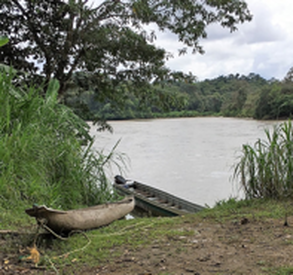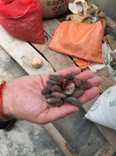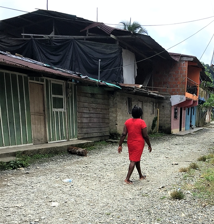HIGHLAND COMMUNITY CHURCH
|
Published in Roots and Branches (Journal of the Mennonite Historical Society of BC), May 2020 By Shelley Dueck, Colombia learning tour participant, MCC BC All photographs courtesy of Shelley Dueck Chocó, an isolated region in Colombia that is neglected by its government and the world, is seemingly forgotten. Still, hope stirs. The Colombian Mennonite Brethren Church pastors continue to hope, pray and live out the Good News through a partnership with Mennonite Central Committee. They offer support to the communities along the San Juan River in three priority areas: relief supplies, sustainable development, and peace initiatives in the name of Christ. On our MCC learning tour to Chocó, we walked single file down the narrow sidewalk of Istmina to the bank of the San Juan River. Carefully, we navigated down twenty-two concrete stairs to the river’s edge. One by one we steadied ourselves on a thirty-foot riverboat, sitting two or three across on a wooden plank, preparing to embark on a thirty-minute journey up the river. Our boat travelled upstream against the current. Along the banks of the river, women were washing clothes and kids played in the contaminated water. When the river overflowed in February 2019, people’s homes and livelihoods were washed down the river. Five hundred families struggled to begin again. Relief aid included a two-month supply of food rations, a stovetop, and basic household items and tools. The food rations and tools not only provided for urgent survival needs, but offered hope to these resilient people who were once again rebuilding their lives. We travelled twenty-five minutes and arrived at the small village of Bocas de Suruco. Silence surrounded us as we walked towards a large open area in front of the Mennonite Brethren Church. As we approached the church, we heard the excited sounds of children’s voices. Inside, a youth club called Faith & Hope was meeting. The children were waiting for crayons that were stored on the second floor of the church where the supplies had been quickly moved during the flood. The peace club used to meet outdoors in front of the church but had been forced to move inside the sanctuary because of a recent armed confrontation in the open square in front of the church. Peace is not an abstract ideal here. It’s a daily longing The peace club topics range from talking about peaceful ways of greeting one another, to practising assertive communication skills and resolving conflict through conversation. The youth and children are eager to find new ways to live, to be a generation that resists conflict, to be influencers for peace in their schools and communities. We arrived at Fagrotes – Fundación Agropecuaria Tejiendo Esperanza, or Weaving Hope Agricultural Foundation – an MCC agricultural partner. Their aim is to provide sustainable farming practices and secure long-term livelihoods for participating farmers. Fagrotes offers crop-planting alternatives to farmers who have previously grown coca, the plant that produces cocaine for the drug trade. They now grow cacao, which produces cocoa beans for making chocolate. One hundred and twenty farmers have partnered with Fagrotes to grow cacao and rice as cash crops to provide for their families. The farmers’ income has become more regular and substantial; food production in the region has increased; and crops that contribute to the drug trade have declined. All of this has taken place with the ongoing risk posed by the armed groups in the region that are losing growers for their product and men and boys to the armed conflict. Pastor Rutilio, Director of Fagrotes emphasizes, “We want to see people living differently, to see agriculture being strong here in this region, big rice crops or cacao crops, and know that people have the income they deserve and that they are able to live better lives with dignity.” MCC’s partnership with the Mennonite and the Mennonite Brethren Churches in Colombia came about via a joint invitation from both conferences to start a program in Bogotá in 2002. In Colombia, MCC works exclusively through the churches, since the pastors are the direct link to the communities and to the needs that are ever-present and growing. With ongoing political instability and armed conflict, the country’s social fabric continues to be weakened. Amid these complexities, MCC’s partnership with the Mennonite Churches in Colombia offers hope. Chocó You are not forgotten Many feelings, no words Emily, a girl with sparkle, attentiveness and leadership Fighting to communicate, fighting to survive; Naming the forgotten, no longer faceless; Giggles, smiles, X’s & O’s; A fingerprint on my heart; Stories to be told; Emily. Shelly Dueck currently lives in Abbotsford, BC, with her husband Gil and their three lovely daughters. She has been serving with MCC BC for three years on the Communication and Donor Relations Team. She also invested 20 years supporting adults with intellectual and physical disabilities and is richer in character and relationships because of this time. Using her gifts and skills to empower the vulnerable and marginalized is her passion and call. For more information about the Mennonite Central Committee (MCC) and the upcoming Festival To-Go and Cyclathon you can go to https://mcccanada.ca/get-involved/events/mcc-festival-go. Each dollar raised at the Festival To-Go goes even further this year, through a 6:1 match!
To find out more about the Mennonite Historical Society of BC visit http://www.mhsbc.com/index.php. |





 RSS Feed
RSS Feed
8/25/2020